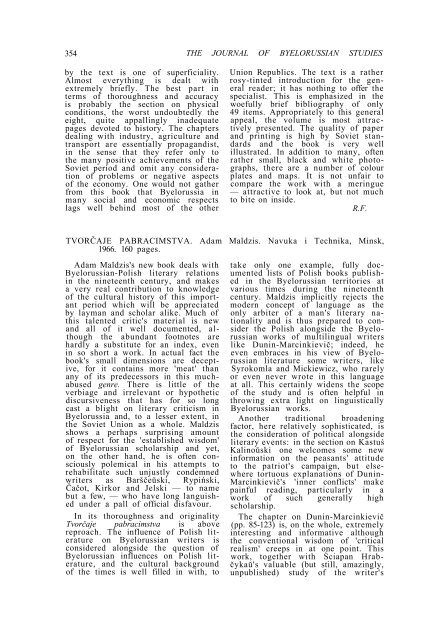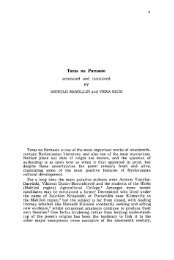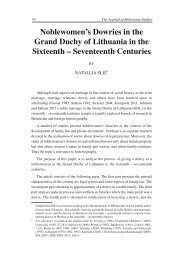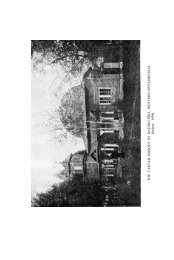Reviews - The Journal of Belarusian Studies
Reviews - The Journal of Belarusian Studies
Reviews - The Journal of Belarusian Studies
You also want an ePaper? Increase the reach of your titles
YUMPU automatically turns print PDFs into web optimized ePapers that Google loves.
354 THE JOURNAL OF BYELORUSSIAN STUDIES<br />
by the text is one <strong>of</strong> superficiality.<br />
Almost everything is dealt with<br />
extremely briefly. <strong>The</strong> best part in<br />
terms <strong>of</strong> thoroughness and accuracy<br />
is probably the section on physical<br />
conditions, the worst undoubtedly the<br />
eight, quite appallingly inadequate<br />
pages devoted to history. <strong>The</strong> chapters<br />
dealing with industry, agriculture and<br />
transport are essentially propagandist,<br />
in the sense that they refer only to<br />
the many positive achievements <strong>of</strong> the<br />
Soviet period and omit any consideration<br />
<strong>of</strong> problems or negative aspects<br />
<strong>of</strong> the economy. One would not gather<br />
from this book that Byelorussia in<br />
many social and economic respects<br />
lags well behind most <strong>of</strong> the other<br />
Union Republics. <strong>The</strong> text is a rather<br />
rosy-tinted introduction for the general<br />
reader; it has nothing to <strong>of</strong>fer the<br />
specialist. This is emphasized in the<br />
woefully brief bibliography <strong>of</strong> only<br />
49 items. Appropriately to this general<br />
appeal, the volume is most attractively<br />
presented. <strong>The</strong> quality <strong>of</strong> paper<br />
and printing is high by Soviet standards<br />
and the book is very well<br />
illustrated. In addition to many, <strong>of</strong>ten<br />
rather small, black and white photographs,<br />
there are a number <strong>of</strong> colour<br />
plates and maps. It is not unfair to<br />
compare the work with a meringue<br />
— attractive to look at, but not much<br />
to bite on inside.<br />
R.F.<br />
TVORČAJE PABRACIMSTVA. Adam Maldzis. Navuka i Technika, Minsk,<br />
1966. 160 pages.<br />
Adam Maldzis's new book deals with<br />
Byelorussian-Polish literary relations<br />
in the nineteenth century, and makes<br />
a very real contribution to knowledge<br />
<strong>of</strong> the cultural history <strong>of</strong> this important<br />
period which will be appreciated<br />
by layman and scholar alike. Much <strong>of</strong><br />
this talented critic's material is new<br />
and all <strong>of</strong> it well documented, although<br />
the abundant footnotes are<br />
hardly a substitute for an index, even<br />
in so short a work. In actual fact the<br />
book's small dimensions are deceptive,<br />
for it contains more 'meat' than<br />
any <strong>of</strong> its predecessors in this muchabused<br />
genre. <strong>The</strong>re is little <strong>of</strong> the<br />
verbiage and irrelevant or hypothetic<br />
discursiveness that has for so long<br />
cast a blight on literary criticism in<br />
Byelorussia and, to a lesser extent, in<br />
the Soviet Union as a whole. Maldzis<br />
shows a perhaps surprising amount<br />
<strong>of</strong> respect for the 'established wisdom'<br />
<strong>of</strong> Byelorussian scholarship and yet,<br />
on the other hand, he is <strong>of</strong>ten consciously<br />
polemical in his attempts to<br />
rehabilitate such unjustly condemned<br />
writers as Barščeŭski, Rypiński,<br />
Čačot, Kirkor and Jelski — to name<br />
but a few, — who have long languished<br />
under a pall <strong>of</strong> <strong>of</strong>ficial disfavour.<br />
In its thoroughness and originality<br />
Tvorčaje pabracimstva is above<br />
reproach. <strong>The</strong> influence <strong>of</strong> Polish literature<br />
on Byelorussian writers is<br />
considered alongside the question <strong>of</strong><br />
Byelorussian influences on Polish literature,<br />
and the cultural background<br />
<strong>of</strong> the times is well filled in with, to<br />
take only one example, fully documented<br />
lists <strong>of</strong> Polish books published<br />
in the Byelorussian territories at<br />
various times during the nineteenth<br />
century. Maldzis implicitly rejects the<br />
modern concept <strong>of</strong> language as the<br />
only arbiter <strong>of</strong> a man's literary nationality<br />
and is thus prepared to consider<br />
the Polish alongside the Byelorussian<br />
works <strong>of</strong> multilingual writers<br />
like Dunin-Marcinkievič; indeed, he<br />
even embraces in his view <strong>of</strong> Byelorussian<br />
literature some writers, like<br />
Syrokomla and Mickiewicz, who rarely<br />
or even never wrote in this language<br />
at all. This certainly widens the scope<br />
<strong>of</strong> the study and is <strong>of</strong>ten helpful in<br />
throwing extra light on linguistically<br />
Byelorussian works.<br />
Another traditional broadening<br />
factor, here relatively sophisticated, is<br />
the consideration <strong>of</strong> political alongside<br />
literary events: in the section on Kastuś<br />
Kalinoŭski one welcomes some new<br />
information on the peasants' attitude<br />
to the patriot's campaign, but elsewhere<br />
tortuous explanations <strong>of</strong> Dunin-<br />
Marcinkievič's 'inner conflicts' make<br />
painful reading, particularly in a<br />
work <strong>of</strong> such generally high<br />
scholarship.<br />
<strong>The</strong> chapter on Dunin-Marcinkievič<br />
(pp. 85-123) is, on the whole, extremely<br />
interesting and informative although<br />
the conventional wisdom <strong>of</strong> 'critical<br />
realism' creeps in at one point. This<br />
work, together with Ściapan Hrabčykaŭ's<br />
valuable (but still, amazingly,<br />
unpublished) study <strong>of</strong> the writer's





